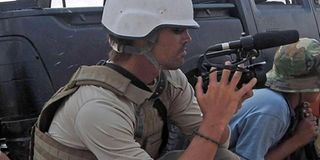Captors demanded $132m for slain newsman

American freelance reporter James Foley (left) on the highway between the airport and the West Gate of Sirte, Libya, on September 29, 2011. The Islamic State jihadist group claimed on August 19, 2014, that it had executed Mr Foley to avenge US air strikes against its fighters in Iraq. AFP FILE PHOTO | ARIS MESSINIS
What you need to know:
- Mr Foley had been reporting for GlobalPost from Syria when he was abducted in November 2012, and Mr Balboni had been closely involved in efforts to locate and free the photojournalist.
- Mr Balboni declined to discuss the response to the ransom but shared the communications with relevant US government authorities, the Wall Street Journal reported.
WASHINGTON
Journalist James Foley’s jihadist captors had demanded a ransom of 100 million euros — $132 million (Sh11bn) — for his release, his employer GlobalPost said Thurrsday after a video of the American’s gruesome execution was made public.
“GlobalPost CEO Philip Balboni confirms that the initial ransom demand from Jim Foley’s captors was 100 million euros,” a spokesman for the news website told AFP.
Mr Foley had been reporting for GlobalPost from Syria when he was abducted in November 2012, and Mr Balboni had been closely involved in efforts to locate and free the photojournalist.
Mr Balboni declined to discuss the response to the ransom but shared the communications with relevant US government authorities, the Wall Street Journal reported.
On Wednesday Balboni said he and the Foley family had earlier communication with the Islamic State captors, who had expressed an initial “receptivity to a negotiation” for Foley’s release.
But the negotiations never progressed, and the captors went silent until recently when they sent a message to the Foleys that their son would be killed.
Meanwhile, earlier today, the US revealed special forces were sent into Syria this year to try to rescue American hostages held by Islamist militants.
“This operation involved air and ground components and was focused on a particular captor network within ISIL (IS),” Pentagon spokesman Rear Admiral John Kirby said.




